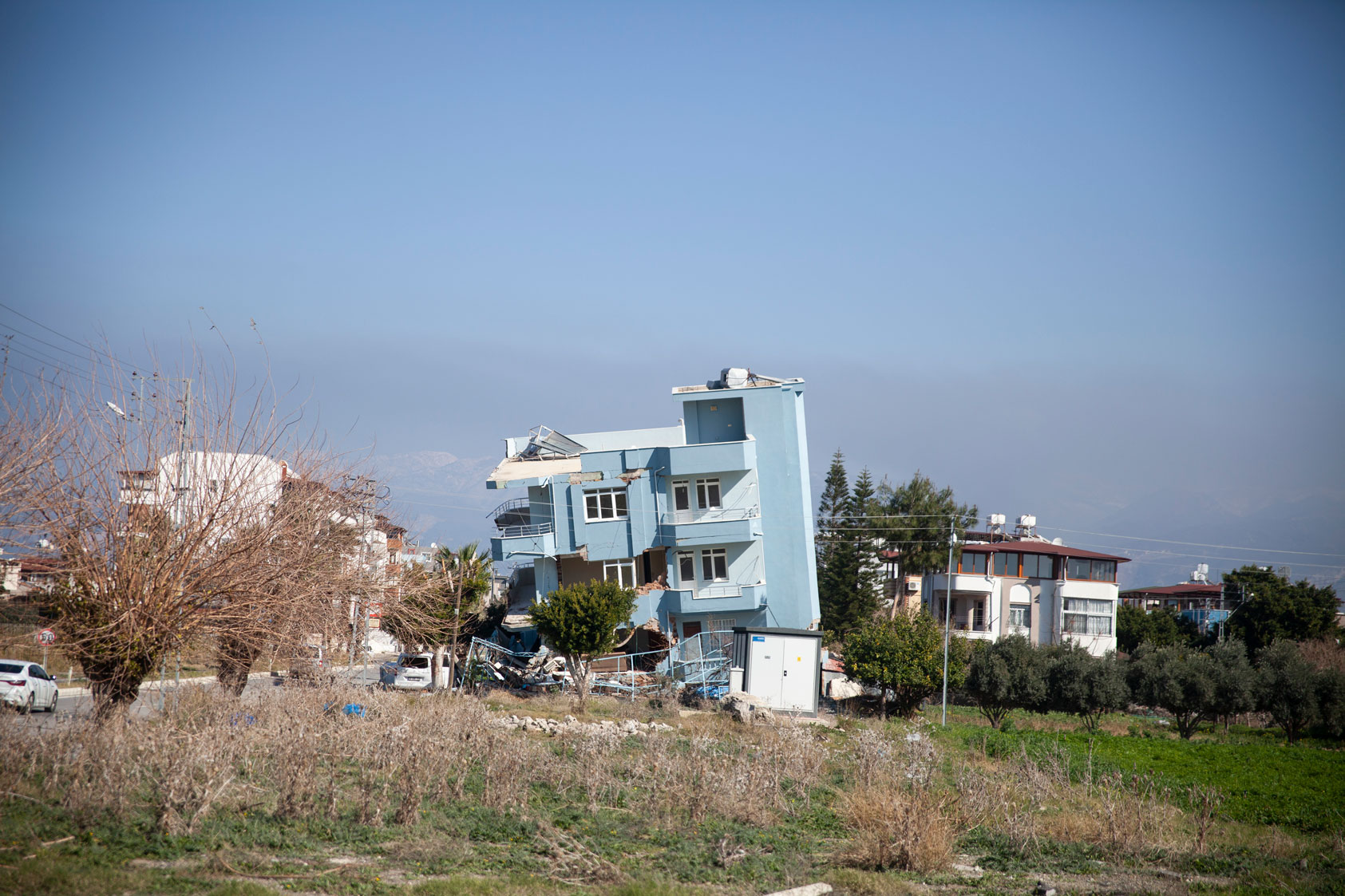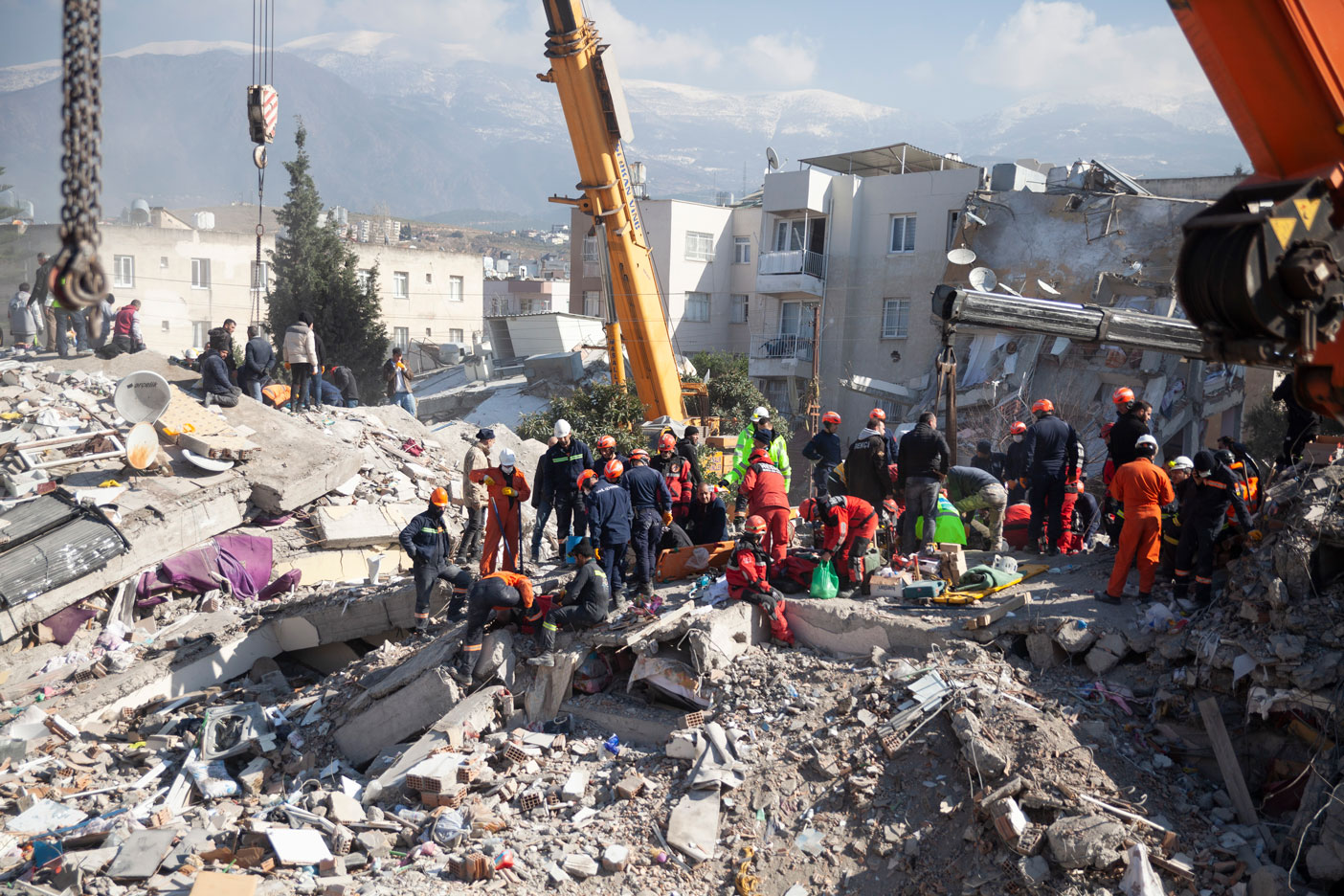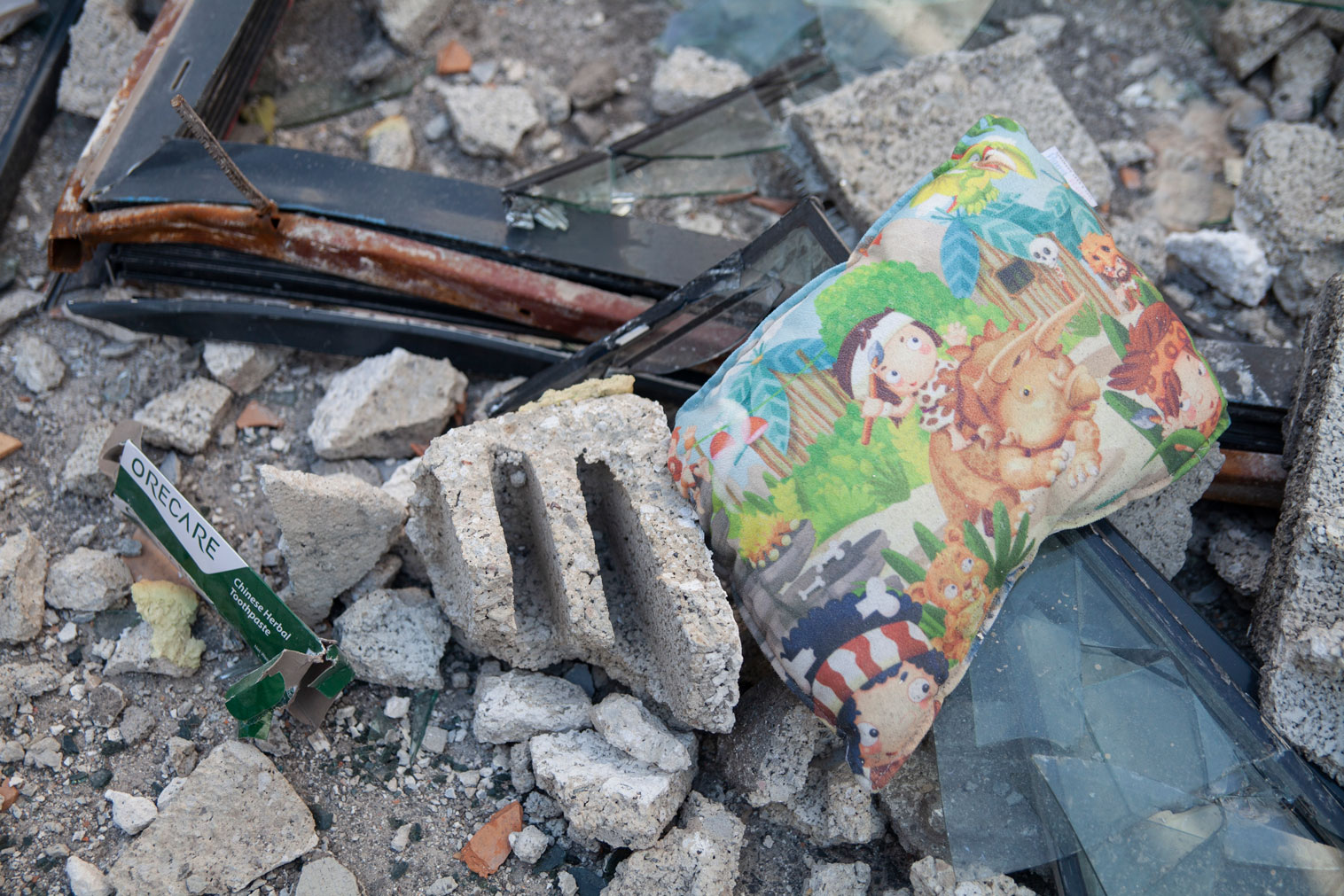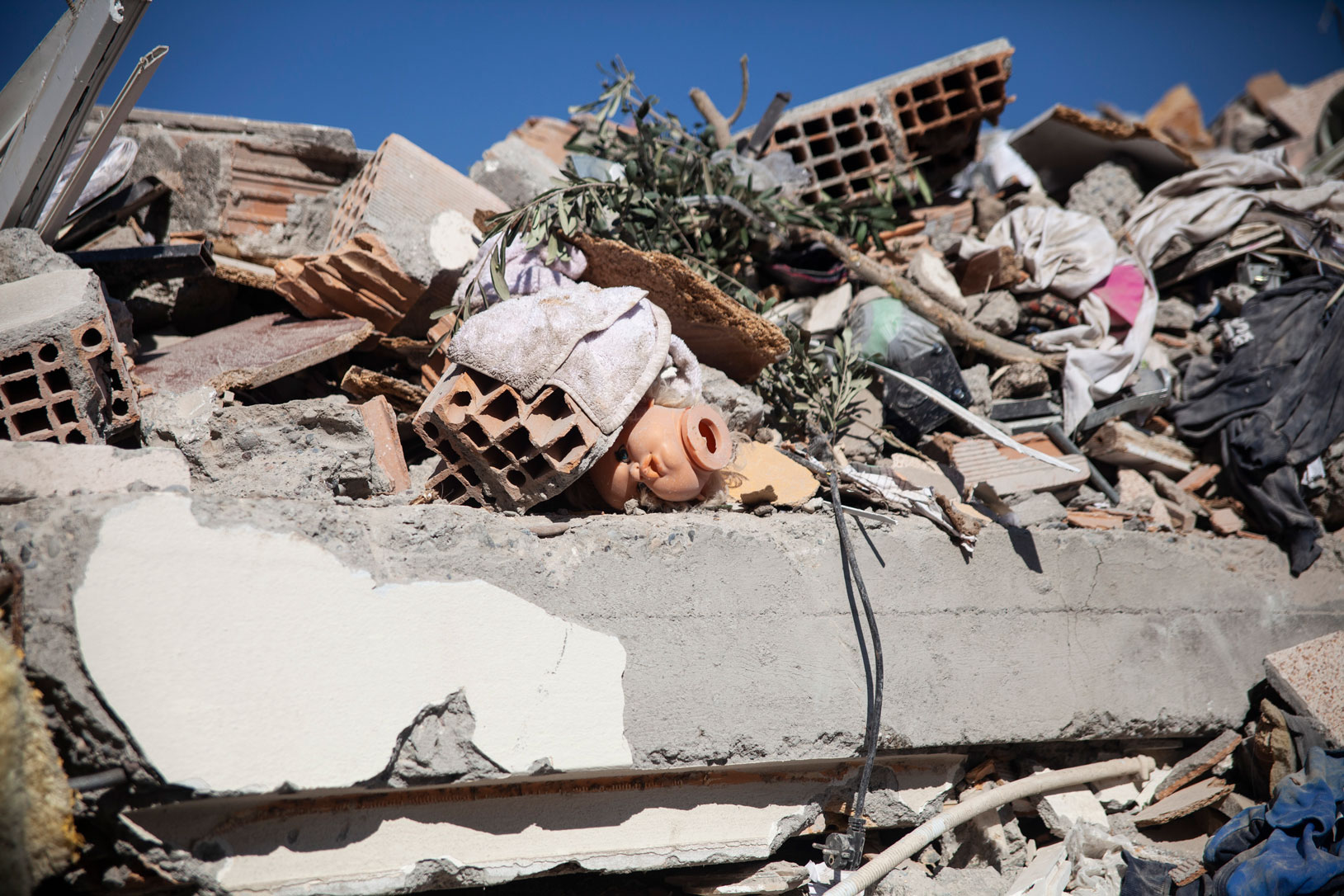It took three days for the U.N. to announce it was readying a convoy of aid to northwest Syria, following the devastating 7.8 magnitude earthquake that rocked Turkey and its neighbors in the early hours of Monday morning.
While 79,110 search-and-rescue personnel, including international teams, had been deployed to Turkey’s east by Wednesday, according to Turkey’s Disaster and Emergency Management Authority (AFAD), those struggling for their lives under the rubble of their homes in northwest Syria could only wait for the overstretched Syria Civil Defence — the White Helmets — to attempt to rescue them.
Only 5% of the impacted sites and towns in northwest Syria are being covered by search-and-rescue operations, according to the U.N. By Thursday, cries for help from under the rubble had grown fainter.
The last 12 years have seen the international community fail in protecting the Syrian people from bombardment by the Bashar al-Assad regime and its ally, Russia. Access to aid, particularly for the 2.8 million people dependent on it in the northwestern enclave, has only become more limited. This week, the U.N. missed a vital chance to stand up to Moscow and Damascus and cease the politicization of aid.
Authorized cross-border points for U.N. aid to be delivered from Turkey to Syria have dwindled over the years to just one remaining crossing, Bab al-Hawa, thanks to continuous vetoes by Russia at the U.N. Security Council against keeping them open.
More recently, U.N. member states have succumbed to Russia’s insistence on only renewing the Bab al-Hawa crossing for six months, rather than the original 12 months, which has placed millions of Syrians in cyclical limbo and hindered U.N. relief agencies as well as nongovernmental organizations from being able to plan long-term programs.
The U.N. Security Council has always argued that its decision to grant concessions to Russia is in the interest of protecting the U.N. operations that have been ongoing in regime-held areas.
Northwest Syria has been in crisis mode for years, so what occurred this week in the aftermath of the earthquake was somewhat inevitable, though also preventable.
Emma Beals, a Non-Resident Fellow at the Middle East Institute, told New Lines the current crisis highlights just how unacceptable the cross-border aid situation has become. “A situation where millions of desperate people rely on a six to 12 monthly renewal, with access reduced every so often, and for the implications of that to have such deadly consequences in an emergency, is not a sustainable way to address the very real needs of those living in the NW,” Beals said.
No U.N. aid crossed the border of Bab al-Hawa until around midday on Thursday. The messaging, or explanation, circulated was that the delay was due to the roads’ being too badly damaged by the earthquake, rendering the border crossing inaccessible. At the same time, bodies of displaced Syrians who had died in their homes in Turkey were being transported in pickup trucks and delivered at Bab al-Hawa to be collected by relatives and buried on the other side of the border.
If Turkish authorities — namely, the municipalities — could organize the transporting of the deceased to the border, amid the overwhelming pressure they were facing to aid their own people, was it really not possible for the U.N. to find a way — say, by downscaling their trucks to smaller vehicles — to navigate the roads and send aid across immediately?
I posed this question to International Crisis Group Senior Syria Analyst Dareen Khalifa, who told New Lines that the roads shouldn’t be an argument or excuse for the U.N. not to send rescue teams or aid. “There are a million routes to Syria,” Khalifa said. “I think the U.N. should have had a more judicious interpretation of the mandate and used other crossings if this one was deemed inoperable.”
Beyond Bab al-Hawa, at least three other border crossings were informally open and operational: Bab al-Salameh, Jarablus and al-Raie.
While these crossings are not technically authorized for use by U.N. convoys, it might have been thought that the strongest earthquake in the region in 100 years was reason enough to at least consider making an exception by opening another crossing for U.N. access. Yet, as Beals points out, “The U.N. can’t unilaterally open another border crossing, but other actors can operate as they see fit,” referring to Syria and Turkey. “Part of the problem has been the hyper-focus on the U.N. response, when it was very clear that the U.N. system had legal and logistical issues that would take time to resolve,” she added.
When asked at a daily briefing whether an emergency opening or humanitarian corridor would be opened, a spokesperson for the U.N. Secretary-General, Stéphane Dujarric, replied, “We will try to get as much aid as possible through that one crossing.”
“I think we need to take things one step at a time to see exactly where the needs are and what can be met through cross-line, what can be met through cross-border, but … the most important thing is to do a needs assessment to know what exactly we need and how we can match up,” Dujarric continued.
It was clear from the onset that using another crossing was not on the table. “The fear of upsetting the Syrian government and the Russians should definitely not have been a factor that any had taken into consideration responding to this crisis,” argued Khalifa.
The U.N. Office for the Coordination of Humanitarian Affairs stated on Wednesday that the cross-border operation had been halted, “as the road connecting Gaziantep [in Turkey] to the U.N. Transshipment Hub in Hatay [also Turkey] was impaired,” and they had now found another way there. Supplies for Syria could have been flown into Turkey’s Adana immediately after the earthquake, especially since the trucks that finally did make it to the border on Thursday contained only backlog supplies of food, water and cleaning materials — not emergency supplies specifically related to the earthquake.
Considering U.N. workers in Turkey were also affected by the earthquake and unable to work in the first hours, non-Resident Fellow at the Middle East Institute Karam Shaar suggested to New Lines that the headquarters for the Syrian rescue operation should have been transferred to another hub — say, in Erbil, Iraq, or Amman, Jordan.
Even with staff absentees, Senior Fellow and Director of the Middle East Institute Syria Program Charles Lister told New Lines, the response in Turkey was prioritized. “Assisting northwest Syria simply isn’t enough of a priority — which is hard to swallow, frankly,” he said.
The Office for the Coordination of Humanitarian Affairs in Gaziantep did not respond to a request for comment.
At the time of writing, a U.N. needs assessment had still not been conducted in northwest Syria. “When I hear U.N. folks in Damascus saying they don’t know what the needs are in these areas, I think that’s an excuse, to be honest,” said Khalifa, adding that there is open access to the region right now, and there are plenty of assessments being made by local organizations to be shared.
On the other hand, a U.N. Disaster Assessment and Coordination (UNDAC) response team dedicated to the response in Gaziantep landed in Adana, Turkey, on Feb. 8, according to an Office for the Coordination of Humanitarian Affairs statement.
Commitment to the humanitarian imperative appears to have been abandoned altogether when it comes to northwest Syria, Lister added. “These are five million of the most vulnerable people on earth, just hit by a near-apocalyptic earthquake and the U.N.’s response is: ‘It’s difficult, but we’re working on it, hopefully we’ll get aid there soon,’” he lamented. “I’d bet hundreds if not thousands of lives will have been lost as a result of this inaction.”
As of this writing, at least 18,342 were reported dead in Turkey and 3,377 people in Syria, bringing the combined total to over 21,000; a number that is still likely to rise further over the coming days, due to the inability to dig out all of the bodies.
What all areas of Syria impacted by the earthquake need access to immediately is heavy machinery to help with search-and-rescue operations. Understandably, Turkey needs all the cranes it has to rescue people within its borders, but if a push had been made by the U.N. or even certain nongovernmental organizations to contract private construction companies in Lebanon, for example, to send machinery to Syria, they could have been there within a few hours. Shaar even suggested companies in Syria should have been incentivized by humanitarian agencies, who could have paid them to move immediately to sites of destruction.
While Turkey has not yet been able to access everyone buried in the rubble of houses, Shaar points out, the share of bodies recovered in Turkey is significantly higher than in all of Syria, “just because of their [slow] response to the earthquake. … Perhaps we wouldn’t have been able to get those trucks to northwest Syria on time, because the regime might not have allowed it, but still, saving people in regime-held areas is just as worth it as in the northwest (of Syria),” he added.
The urgent need for heavy machinery is passing fast; as the days go on, it will naturally turn from a rescue mission to a retrieval mission, because most people, tragically, will have suffocated or succumbed to injury or the freezing cold.
If the U.N. can’t put aside politics and act courageously in times of emergency, then Syrians and other civilians alike will continue to pay the price. “The U.N., with the enormous resources at its disposal, is more than capable of surging assistance into the northwest, but it’s more concerned about keeping Damascus happy than rescuing the lives of Syrians in Idlib,” Lister concluded.
Sign up to our mailing list to receive our stories in your inbox.







